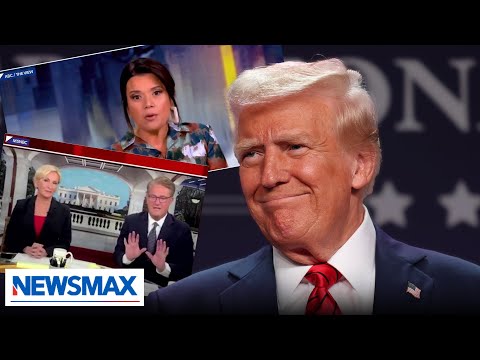In a world where the media loves to fuel panic and create chaos, the recent whirlwind of events surrounding former President Trump has turned the supposed doom and gloom into a tale of surprising triumph. Just when it seemed like a trade war was set to wreck the economy, reality struck a different chord. Early reports painted a bleak picture of plummeting stock markets—specifically a Dow drop of over 500 points and the fear of America’s trading partners retaliating with tariffs of their own. But as the day unfolded, something unexpected happened: the stocks began to recover, and Mexico’s President announced a dramatic commitment to bolster border security. Isn’t it funny how quickly things can turn around?
Most people were bracing for intense fallout from Trump’s bold move to impose a 25% tariff to encourage Mexico and Canada to tighten their borders against drugs and illegal immigration. However, what appeared to be a calamity quickly transformed into what some might call a diplomacy success story. The President of Mexico swiftly agreed to send 10,000 troops to the border, demonstrating that sometimes the threat of a little economic pressure can lead to major changes. Who would have thought that a little bit of tough love might actually get results? Trump’s critics, initially howling about inciting chaos, found themselves at a loss for words as things seemed to be working out.
It’s essential to consider the bigger picture. When top Democrats were busy speculating about the negative consequences of tariffs, Trump was focused on protecting American lives from the dangers posed by fentanyl and ensuring fair trade practices. With a staggering 200,000 deaths attributed to fentanyl overdoses in America, one can understand why the former president is determined to take action. While some politicians may prioritize economic relationships over the health of American citizens, it seems that Trump has a different approach. By tackling such pressing issues head-on, he may very well be saving lives while rebalancing trade relations—a win-win situation not easily grasped by the experts clinging to their old-school wisdom.
But even as progress was made, the vocal naysayers continued raving on primetime television. The same pundits who cried foul over the tariff strategy pointed fingers, convinced that everything was heading for disaster. “Goodbye to avocado toast and tequila,” they lamented as if the impending price increases on these popular items somehow overshadowed the potential to save thousands of American lives. It’s almost as if anyone paying attention would realize that the focus should not be solely on costs at the grocery store; rather, it should be about implementing strategies that address the root causes of both economic imbalance and public health crises.
Amidst this whirlwind, the efforts to address U.S. Aid also gained momentum. With Secretary of State Marco Rubio now overseeing the agency that has been criticized for wasteful spending, there is a growing sense that reforms may finally be on the horizon. For years, the frustration with U.S. Aid’s inefficiency and its role in pushing a questionable agenda has been palpable among citizens who want their taxpayer dollars used more effectively. By aligning aid with core national interests, the Trump administration appears committed to putting American priorities front and center—something that has been sorely lacking in recent years.
As this new chapter unfolds, it’s crystal clear that the road ahead won’t be smooth, and that’s okay. Change is often accompanied by resistance and tumult. Whether it’s tariffs or reforms, the adjustments in Washington are bound to stir the pot. However, the ultimate aim is not merely to create more headlines but to shift America back into its rightful place as a leader on the global stage—both economically and socially. With fresh strategies and a team that’s willing to fight for what many believe in, the nation might just be on the brink of transformative progress. After all, isn’t that what democracy is all about?



